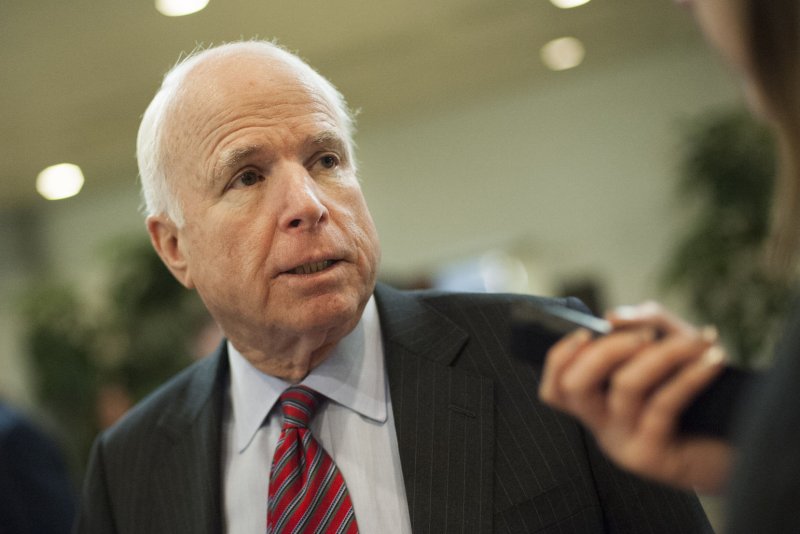Sen. John McCain (R-AZ) talks to a member of the media following a Senate cloture vote on the Budget Resolution, on Capitol Hill in Washington, D.C. on December 17, 2013. The Ryan-Murray budget deal passed 67-33. UPI/Kevin Dietsch |
License Photo
WASHINGTON, May 14 (UPI) -- A new Senate report revealing troubling vulnerabilities in online ad networks that have exposed consumers to malware attacks is the first step in a new bipartisan effort to tighten online security.
Citing examples of cyber attacks on YouTube and Yahoo where malware was downloaded to computers without users even interacting with malicious ads, Sen. John McCain, R-Ariz., said the report was meant as a warning for the industry to do more.
In some cases, he said, a seemingly innocent ad could contain malware, or the malware-laden ad may not be visible at all.
The report found that self-regulation has not been adequate in protecting ad networks and the websites that use them from "inventive" cyber criminals. McCain said his goal was to include strengthened regulations in future cyber security legislation, but to put the impetus on the industry to make changes for itself.
"We want to do more," McCain said. "Obviously the first option that all of us who call ourselves conservatives want and that is for the outfits themselves to do the policing."
"But I think we're going to have to perhaps enact legislation in which we would give them both the requirement and the ability to better police these websites," he said. "And since we are talking about sometimes breaches of national security importance then obviously there's some role for the government to play."
McCain, who initiated the investigation of the Committee on Homeland Security's Permanent Subcommittee on Investigations, said the objective was to raise consumer awareness and push ad networks to make the necessary changes to protect consumers.
He praised the efforts of a newly formed group of Internet industry leaders, comprised of AOL, Facebook, Google, Twitter and Yahoo, to take steps toward those goals. The group launched TrustInAds.org, in an effort to collaborate on the best practices to fight bad ads and get the word out to consumers and policy makers.
Yahoo and Google will both send representatives to a hearing before the subcommittee Thursday morning.
Read the report:
Online Advertising & Hidden Hazards to Consumer Security & Date Privacy















